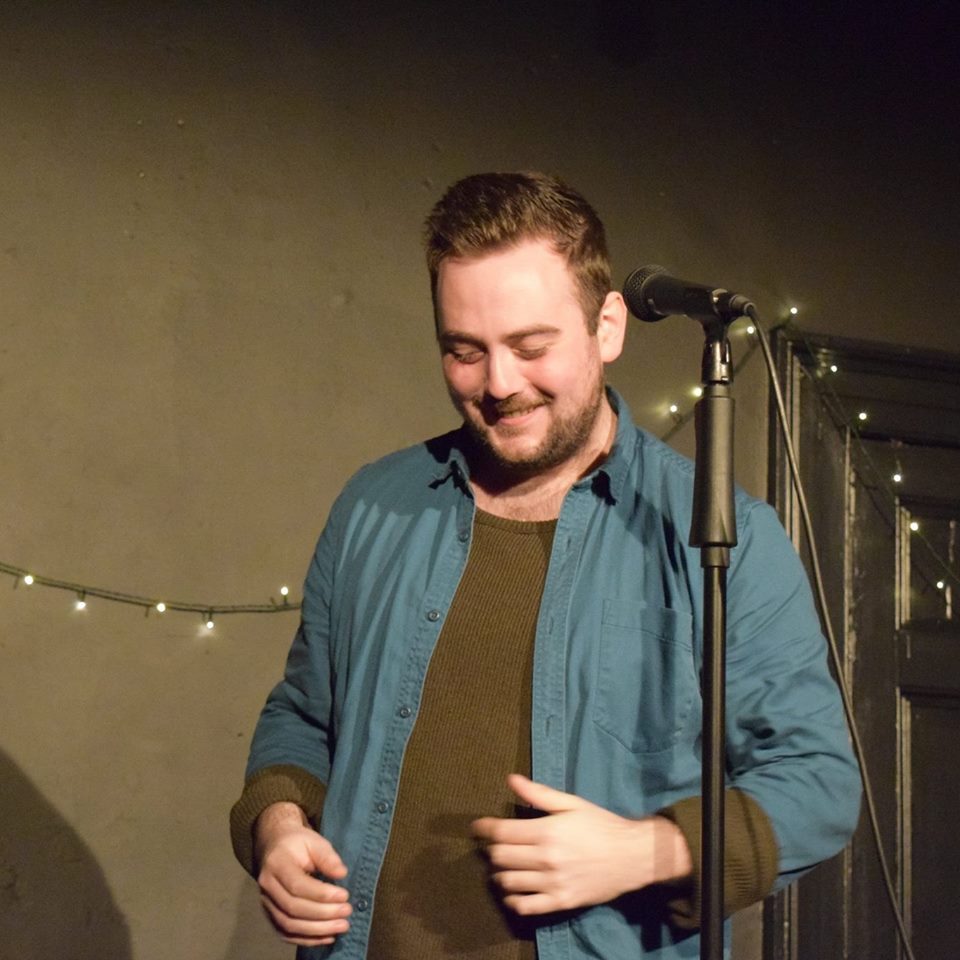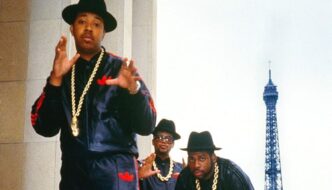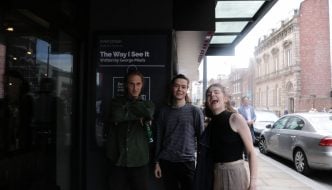‘We recycle each other through our experiences and lives’: Poet Ciarán Hodgers on his new book
October 1, 2018

Courtesy of Kate Jeans
With a book launching next week and a 30 day tour to follow, Ciarán Hodgers is a very busy poet. His new poetry collection Cosmocartography touches on feelings of belonging, cultural identity, and more ethereally, meaning in general. Here, in conversation with Michael Sutton, he muses on the nature of writing and the importance of poetry, from politics to landscape.
First of all, what drew you to poetry over other forms of writing?
I think it’s easier to access poetry, because there are arguably less rules than other forms of writing, and when you’re young you just want to get writing don’t you?
I kind of hated poetry in school. It didn’t relate to anything I knew, but I did love the tricks that poets used – John Donne, Sylvia Plath, Eavan Boland. They were playing a trick with you. It was like a joke almost; and a joke is just a trick where the pay-off is a laugh. The same is true of poetry, except the pay-off is a feeling or a moment or a realisation.
Your upcoming book has a really interesting and unique title. Can you explain how you came up with it and what it means to you?
I’m glad you said “interesting and unique” and not “pretentious”, as I’m sure many people will think. The title literally means cosmo, meaning stars, and cartography, meaning the science and art of making maps. The idea is that we as individuals are like constellations. We collect a whole range of experiences and these are like stars; they make up and place meaning on our overall constellation, on our personality.
The title itself came from a completely different piece of work that I was commissioned to write for The European Science Forum, where they wanted a ten-minute piece of performance based on an astrophysicist’s research into the first few billion years between the Big Bang and the first star. In that science, I found a really beautiful pattern of humanity – how we move and change, we almost recycle each other through our experiences and lives. From there, the title became an umbrella of sorts that welcomed the whole structure of the collection under its wing.
In your introduction to Cosmocartography you write that the first chapter deals with “the constant custody battle” over your identity. What do these poems say about identity and foreignness?
Yes, the chapters are all split into different versions of love you might find in Ancient Greece. They had different versions of love, giving specific words for. say. familial love, sexual love, love of the universe, love of yourself, love of politics, love of ideas. The first chapter, Storge, details my relationship with nationhood, my cultural identity. I wasn’t a very Irish person until I left. I almost resisted Irishness as a thing because it was like, “Ah it’s so twee, it’s so boring, I want to be cool and metropolitan,” which didn’t seem an Irish thing to be at the time. Since leaving, I’ve discovered the opposite is true. Ireland is bustling with a really radical, amazing energy and I’m sorry to be missing out on it. I hope that me moving and this new “cool” Ireland emerging aren’t linked!
The book feels very respondent to modern culture – there’s lots of references dotted throughout. Is that something that comes naturally in your writing, or are you trying to mirror culture in some way?
Yes, I think it just comes naturally. Those signifiers are so interesting, because they come filled with people’s experiences or memories of them. You can link a thought or a mood to a specific time or event. They’re almost like decorations you put on something to give it a personality. There’s a million poems written about Liverpool and they all have very different things that they see as important to Liverpool, the Docks, the Beatles, the Liver birds, that kind of thing. They’re all just the decorations that you put on the city.
They can also be used to pull on ironies and create tension, like in my “X” poem, which is about the abortion rights struggle and the treatment of women, especially pregnant women, in Ireland. There’s some horrific things that have happened to women in Ireland, the X case in particular – it’s the X case because the person could not be legally named in court – that idea of an X can shift. You can travel through an idea, almost like when you stand between two mirrors and there are hundreds of versions of you. X might mean this in one reflection, then in the next it can represent something else, then next maybe “X marks the spot”, then it’s a kiss on the cheek, a signature, a cross on its side. I love how an idea can hopscotch around the meaning. It can be really powerful.

There’s also a strong political element that manifests itself more and more as the book goes on. Are there any challenges to writing political poetry in these strange, chaotic times we live in?
Yes, the first challenge I think is: do you have all the information? Is it true information? Are you going to use it fairly? Are you going to use it well, and are you going to use it in a way that actually aligns with your own personal politics? What are your personal politics?
That particular chapter you’re talking about was the most challenging because it was not my go-to process. Most of the book draws on my own lived experiences, but I was interested with the idea of solidarity, resilience and protest, drawing on a tradition of spoken word utilised as a political movement, but they were surely the most difficult pieces to write. Suddenly I’m not talking just about myself anymore, I’m talking about somebody else. You have to act responsibly when you’re doing that. I hope I’ve acted responsibly with the work in that chapter.
I think it’s important, when not talking about your own lived and others’ experiences, to not try to represent anyone but yourself. Talk about your perceptions, feelings and thoughts, but don’t put words in other people’s mouths. Also, try to add something to the wider conversation. We all know racism is bad, but what next? What else can you say that might be important or specific about it?
In the third chapter there’s a change in tone with some really interesting takes on landscape poetry, which corresponds to a larger mystical theme in the book. Can you talk about those poems a little bit and how they came about? And why do you think poetry is so good at describing the unseen and unknown?
Yes, so the sort of nature chapter was a weird one and a little bit unexpected. That chapter moves from something like landscape poetry to a witchy, spiritual magic kind of mood.
Growing up in Ireland you forget how stunning nature can be. You take it for granted. Me and my friend once walked home from a house party along the beach. It was like something in Angela’s Ashes – at seven in the morning with a bottle of whisky and no shoes, but to have this really astounding moment of watching the sunrise on the beach and a horse and carriage going by when you’re absolutely hammered is sort of beautiful.
Nature poetry and landscape poetry is really important for documenting the land and the stories of the land, because otherwise they got lost and that upsets me, it actually mortally upsets me that the story of a land or of a person can be forgotten because we never thought to write it down.
The book comes out this month, and there’s a preview on 4 October. Where is that going to be and what will it entail?
The first outing of the book is going to be at the October Beers for Queers in District on the fourth, down at The Baltic from 7pm. I love Beers for Queers. I love what they do. Their posters are amazing, because they’re highlighting iconic queer artists – and that is powerful stuff. Linster and Dan know exactly what they’re doing. They’re a grass roots organisation and I’m very grateful to them for having me. It’s in association with Writing on the Wall [the literature organisation and festival], who I work for, who have very graciously offered me so much support at a really busy time.
And you’re going on tour in the winter as well?
At the moment I’m doing around a thirty date tour around the UK and Ireland. The official tour launch is happening on 6 October, two days after the preview in Liverpool. Then I go to Dublin the night after, and them I’m in Manchester, Salford, Bristol, London, Birmingham, Derby, Edinburgh, Glasgow, Newcastle, Crewe, Chester, Wrexham, Sheffield, Halifax, Wigan, all over. It feels really quite humbling to have so many people around the country and around Ireland just go, “Yeah, let’s have you, come on.” I love travelling and I love experiencing new places, so yeah, bring it on.
National Poetry Day ‘Cosmocartography’ Preview @ Beers for Queers. See the event page here
‘Cosmocartography’ is published by Burning Eye Books and can be bought here
Filed under: Written & Spoken Word
Tagged with: belonging, book, Ciarán Hodgers, Cosmocartography, Culture, Identity, Irish, poet, poetry, spoken word, writing



Comments